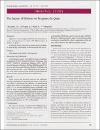The Impact of Diabetes on Pregnancy in Qatar
Abstract
Objectives: To investigate maternal and neonatal outcomes of pregnancies in women with different types of diabetes in Qatar. To identify factors such as age, family history of diabetes and obesity contributing to the increased risk of GD.
Design: The design of this study is retrospective.
Materials and Methods: il4 pregnant women with different types of diabetes including 143(28%) Impaired Glucose Tolerance Test (IGTT), 334(65%) Gestational Diabetes (GD), 26(5%) Insulin Dependent Diabetes Mellitus (IDDM) and 11(2%) Non Insulin Dependent Diabetes Mellitus (NIDDM) who delivered between Jan - June 2004formed the subject of this study.Data extracted from the files included maternal characteristics, fetal and maternal complications.
Result: Eight women had abortions and two had stillbirths, leaving a final dataset comprising 504 women (141 IGTT, 332 GDM, 21 IDDM and 10 NIDDM). Two hundred and eighty three (56.2%) were Qatari.53 %(n = 267) aged >30 years, 57.5 %(n = 290) had family history of diabetes, only 16.1 %(n = 81) treated by insulin.Polyhydramnios was the most common antenatal complication occurred in 15 %(n = 76). No maternal mortality.The overall Cesarean section was 6.2 %(n = 31),.Preterm delivery 5.8 %(n = 29). Macrosomia appeared in 7.3 %(n = 37) infants and congenital malformations in 2 %(n = 10) infants.
Conclusions: We observed that the risk factors for GDM found in other studies are generally valid for our population. Also we found that IDDM has a poorer outcome than NIDDM. However a future prospective study is need it to draw firm conclusions regarding the relative magnitudes of the adverse effects between the different diabetic groups
DOI/handle
http://hdl.handle.net/10576/28919Collections
- Biomedical Sciences [845 items ]


